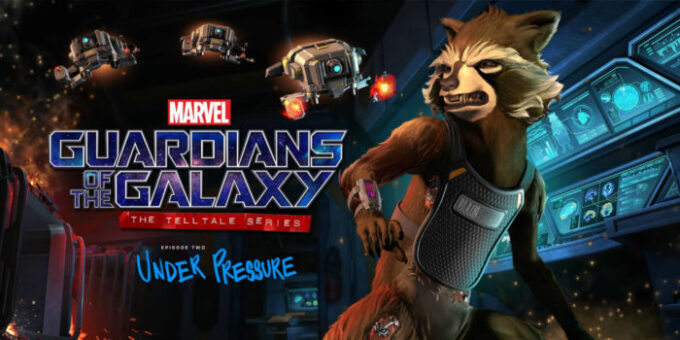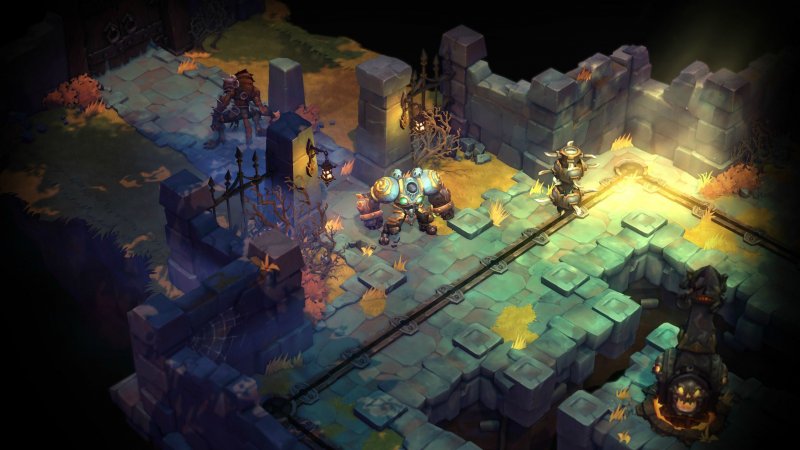This review contains spoilers for Episode One of TellTale’s Guardians of the Galaxy. There will be no major spoilers for Episode Two.
Under Pressure veers away from the main story of TellTale’s Guardians to focus on Rocket Raccoon’s backstory, with surprisingly poignant and successful results.
TellTale’s Guardians of the Galaxy: Episode 2 – Under Pressure
Developer: TellTale Games
Price: $24.99 for the Season Pass
Platforms: PS4 (reviewed), Xbox One, PC, Mac, Android, iOS
MonsterVine was provided with a PS4 code for review.
As a comic book fan, the mention of Half-World near the beginning of Episode 2 – Under Pressure got me excited. The idea of visiting Rocket’s “home” world (or at least where he became the lovably violent scoundrel we know) felt too good to be true, primarily because it would be difficult to tie that into the Thanos plot. And while including unnecessary segments in a 5 episode season would normally be a bad thing, Under Pressurepulls it off in a spectacular manner, providing players with a Rocket Raccoon-centered story that adds a great deal of depth to the heavily-armed rodent.
As the episode begins, Star-Lord is understandably confused. After being brought back to life by the mysterious Infinity Forge while being plagued with seemingly altered memories of his late mother, he and his team decide to investigate the purpose of the ominous artifact. After an admittedly too-short visit with Yondu, the Guardians set out to find some answers. Like with previous TellTale titles like The Wolf Among Us, you’re given the option of going to two different places in a time-sensitive manner. While you’ll go to both locations eventually, the events that will transpire are changed by the order you visit in.
When given the choice between meeting Nebula at the Collector’s place, or going to Half-World for Rocket, I decided to visit Half-World, interested in TellTale’s rendition of Rocket’s origins. I was quite impressed with what I saw, and with how willing TellTale is to make these characters their own. Rocket’s beginnings as an experiment, only hinted at in the films and more expanded upon in the comics, are portrayed in a way that is far more emotional than I had expected. Seeing these events affect present-day Rocket was especially moving, and I’m sure I’m not the only one who never expected to see Rocket openly sobbing out of sheer sorrow.
The flashback story of Rocket and Lylla the Otter trying to escape the Half-World lab facilities is an emotional roller-coaster, even though you know it can only end one way. Being able to create the relationship between the two makes the end of the flashback even harder to play through, thanks to some genuinely heartfelt dialogue and exceptional voice-acting. The choice towards the end of the flashback is especially difficult, as you know that both endings will be equally tragic. This focus on Half-World and Rocket Raccoon is indicative of how willing TellTale is to focus on characters as well as broad story strokes, which is a good sign for future adaptations. I was glad to explore Rocket’s past, even if it meant having less of the main plot.
The story outside of Half-World is interesting, but it doesn’t progress too much. Another Kree battle, and another visit to the Kree temple make it feel somewhat derivative of the previous episode, but if that’s the cost for such a fantastic side-story, I’m willing to let it slide. It feels as though a lot is being set up for future episodes, so we’ll see where TellTale takes us.
The minor pieces of world-building were commendable in Under Pressure, from the ability to play music throughout the Milano, to the easter egg-filled goodness that is Star-Lord’s e-mails. Howard the Duck sending Pete an e-mail was an unexpected surprise, but seeing a piece of spam mail from the Universal Church of Truth lead to a bit of a fanboy moment. Whether it’s a throwaway joke or a hint at future plot threads, it’s an exciting tidbit that will get fans excited. On an even more minor note, the fact that Groot sends his friends chain letters is too perfect to not bring up.
The TellTale engine still needs work, though if you’ve read any of my previous TellTale reviews, this isn’t news. This episode performed rather well compared to the previous one, outside of some audio balancing issues that made the music too quiet beside voices and sound effects.
The Final Word
Under Pressure is a very successful experience that shows how well TellTale understands the importance of character-based stories. While the major storyline didn’t move forward too far, the focus on Rocket and his past was well worth the trade.






